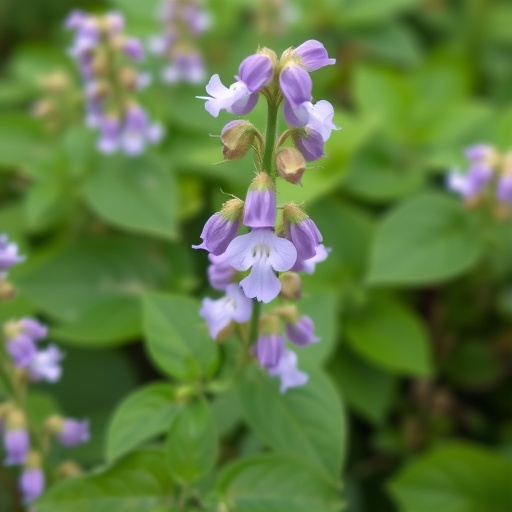Emerging research has spotlighted an age-old remedy with a novel application: Malva sylvestris, commonly known as mallow, is showing promising results as a mouthwash to alleviate chemotherapy-induced stomatitis and its associated pain in cancer patients. This groundbreaking triple-blind randomized clinical trial, conducted in Iran in 2024, has laid a scientific foundation that could revolutionize supportive care in oncology by offering a safer, potentially more effective alternative to traditional treatments.
Stomatitis, a painful inflammation of the mucous membranes in the mouth, is a frequently encountered and debilitating side effect of chemotherapy. It complicates cancer treatment by impairing oral intake, diminishing quality of life, and sometimes forcing reductions or interruptions in chemotherapy dosing that can compromise overall therapeutic outcomes. Current treatment options, including chlorhexidine mouthwash, aim to reduce infection and inflammation but often carry side effects or only provide modest relief.
The clinical trial enrolled 70 cancer patients suffering from chemotherapy-induced stomatitis to evaluate whether Malva sylvestris mouthwash could offer enhanced symptom control. Participants were meticulously randomized into two groups: one receiving 15 ml of Malva sylvestris mouthwash thrice daily for 14 days, and the control group using standard chlorhexidine mouthwash under identical regimens. Importantly, the study was designed as triple-blind—meaning neither the patients, healthcare providers, nor outcome assessors knew the group assignments—thus ensuring unbiased assessment of outcomes.
Throughout the study, stomatitis severity and pain levels were precisely tracked using the World Health Organization’s Mucositis Scale and the Visual Analog Scale for pain, respectively. Measurements at baseline, day 3, day 7, and day 14 provided a comprehensive temporal profile of efficacy. Prior to intervention, both groups exhibited comparable baseline scores, reinforcing the validity of subsequent comparative analyses between the two treatment modalities.
By day 7, stark contrasts emerged. Patients in the Malva sylvestris group showed significantly reduced stomatitis severity and experienced less pain compared to their counterparts receiving chlorhexidine, with p-values indicating robust statistical significance (p < 0.001). These findings are particularly remarkable given the limited therapeutic arsenal currently available for mucositis management.
The trajectory of stomatitis improvement was also notably steeper in the intervention group. Statistical analysis revealed that not only did Malva sylvestris mouthwash reduce symptoms more effectively, but it also expedited healing progression compared to the control. This accelerated recovery timeline is critical for cancer patients, potentially facilitating sustained chemotherapy regimens without dose-limiting interruptions due to oral side effects.
By day 14, although both groups showed improvement, the difference in stomatitis severity between the Malva sylvestris and chlorhexidine groups narrowed and did not reach statistical significance (p = 0.08). Nevertheless, the overall trend favored the mallow-based mouthwash, hinting at persistent therapeutic benefits over the standard care period.
The bioactive compounds in Malva sylvestris, including mucilaginous polysaccharides, flavonoids, and phenolic acids, are believed to orchestrate its anti-inflammatory, antioxidant, and wound-healing properties. These bioactivities likely underpin the observed clinical benefits, representing a compelling example of traditional phytotherapy harnessed through rigorous clinical validation in modern medicine.
Importantly, the trial highlighted a favorable safety profile for the Malva sylvestris mouthwash. No adverse effects nor complications were reported, underscoring its potential as a low-risk adjunct or alternative for oral mucositis management. Given the vulnerability of cancer patients, such safety assurances are paramount in clinical decision-making.
The study’s triple-blind design and randomized methodology underscore its scientific rigor, minimizing bias and enhancing the reliability of findings. The use of internationally recognized assessment scales ensures that results are interpretable within the broader context of mucositis research.
These results have widespread implications for oncology practice worldwide. By integrating Malva sylvestris mouthwash into supportive care protocols, clinicians may improve patient comfort, reduce the burden of chemotherapy complications, and potentially mitigate costs associated with managing severe mucositis.
Future research directions include larger-scale multicenter trials and investigations into the mechanistic pathways by which Malva sylvestris exerts mucosal protection and pain reduction. Additionally, exploring its use across diverse cancer types and chemotherapy regimens could broaden its applicability.
This innovative trial paves the way for renewed interest in medicinal plant-based interventions, bridging ethnobotanical knowledge with contemporary clinical oncology. As the demand for safe and effective cancer supportive therapies grows, Malva sylvestris emerges as a promising candidate in the therapeutic landscape.
The study also illuminates the importance of holistic care approaches incorporating natural compounds with proven efficacy, epitomizing a modern renaissance in phytotherapy guided by evidence-based medicine.
In an era where cancer survival rates improve, quality of life considerations are paramount. Malva sylvestris mouthwash, as demonstrated by this research, holds considerable promise in addressing the challenging side effect of stomatitis, ultimately enhancing overall patient well-being during chemotherapy.
As scientific communities embrace such integrative treatments, patients stand to benefit from adjunctive therapies that are both efficacious and well-tolerated, marking a significant step forward in comprehensive cancer care.
This landmark trial indicates a future where the boundaries between traditional remedies and conventional medicine grow increasingly synergistic, offering patients novel solutions informed by both heritage and innovation.
Subject of Research:
Effectiveness of Malva sylvestris mouthwash in treating chemotherapy-induced stomatitis and associated pain.
Article Title:
The effect of Malva sylvestris mouthwash on chemotherapy-induced stomatitis and associated pain in patients with cancer: a triple-blind randomized clinical trial.
Article References:
Salmaninejad, Z., Mazhari, F., Pourhosseini, S. et al. The effect of Malva sylvestris mouthwash on chemotherapy-induced stomatitis and associated pain in patients with cancer: a triple-blind randomized clinical trial. BMC Cancer 25, 1695 (2025). https://doi.org/10.1186/s12885-025-15158-w
Image Credits: Scienmag.com
DOI: 10.1186/s12885-025-15158-w (Published 03 November 2025)
Tags: alternative treatments for stomatitiscancer supportive carechemotherapy-induced stomatitis treatmentclinical trial for mouth painherbal remedies for chemotherapy side effectsimproving quality of life in cancer patientsMalva sylvestris mouthwashoral health in cancer treatmentpain relief in cancer patientsrandomized controlled trial in oncologyside effects of chemotherapytraditional vs modern remedies





